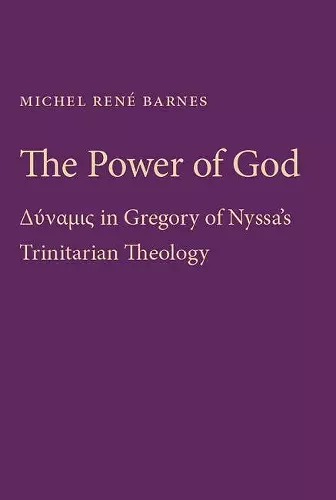The Power of God
Dynamis in Gregory of Nyssa's Trinitarian Theology
Format:Paperback
Publisher:The Catholic University of America Press
Published:30th Jun '16
Currently unavailable, and unfortunately no date known when it will be back

Gregory of Nyssa is widely regarded as the most substantial thinker and theologian among the three Cappadocians and is often used as the representative of Greek trinitarian theology. Through a fresh examination of Gregory's trinitarian theology in its historical context, Michel René Barnes reveals the special importance of the concept of ""power""--dynamis. The book also brings to light the way in which ""power"" served as a fundamental concept in all stages of patristic trinitarian theology and shows the origins of the concept in Greek philosophy and medicine.
The most important senses of ""power"" have little to do with political or physical power. Since the time of the pre-Socratics, Greek philosophy and medicine used the term to refer to the capacity of anything to be a cause. It is this sense of ""power"" that figures so substantially in the development of the doctrine of the Trinity in the patristic period. Indeed, what is recognized as the definitive form of Nicene trinitarian theology--normative for all Christians--was established in the second half of the fourth century using arguments based on an understanding of God as a cause--God as a ""power."" Nowhere is the importance of ""power"" for supporting a Nicene trinitarian theology as great and as closely argued as it is in the theology of Gregory of Nyssa.
This study will be useful for those who study the development of the doctrine of the Trinity, as well as those who are interested in the role of scriptural and philosophical resources in Christian theology. Finally, the in-depth account of the importance of the philosophical use of ""power"" will be of use to scholars of ancient and hellenistic Greek philosophy.
The book is wide-ranging, informed, and clearly written and organized."" - The Historian
""This exceedingly stimulating and very wide-ranging book explores the prehistory of the use of the word ""power"" in the various philosophical and theological contexts from the fifth century BC to the fourth century AD. At the same time this provides a context for the understanding and evaluation of the idea in the Eunomian controversy, above all in the dense writings of Gregory of Nyssa, especially in those directed against Eunomius...[A] lucid and profound study of God's productive power."" - Anthony Meredith, SJ, Journal of Theological Studies
""This thoroughly researched volume proposes a groundbreaking reinterpretation of Gregory's Trinitarian theology in which [power]is a central concept. To support his claim about this concept's importance, Barnes provides a carefully nuanced, extensive, and largely convincing historical survey of the word's meaning in Greek philosophical and medical writers as well as in Christian authors up to Gregory's time."" - Journal of Early Christian Studies
""Examining Gregory of Nyssa's use of the Greek term dunamis (power), Michel Rene Barnes offers a novel argument about the strong role of technical Greek philosophical ideas and terminology in Gregory's trinitarian theology... The most hermeneutically fruitful insights of Barnes's study emerge from his analysis of the 'technical' sense of dunamis in pre-Platonic medical thought... These chapters contain fascinating and original studies of Tertullian, Hippolytus, Origen, Eusebius, Athanasius, Hilary, and Ambrose. Barnes's primary interest, however, is in how Plato's transformation of dunamis influenced fourth-century trinitarian theology in general, and Gregory's theology in particular...Sweeping and provocative... brilliant... [His work] has the potential to recast not only the scholarly field of patristic Trinitarian theology but also current debates about the possibility and/or desirability of rehabilitating classical Trinitarian orthodoxy in contemporary theology."" - Theological Studies
""Written with the lucidity and lightness of touch that is characteristic of Barnes's work. In the case at hand, this means that Barnes traces the antecedents of Gregory of Nyssa's understanding of dynamis (""power""-though, as Barnes shows, the term is more supple than that) back to the Presocratics, and does so in a way that is informative and even pleasant to read...The study is extremely impressive. Barnes writes with verve and yet manages to express complex ideas without recourse to cumbersome jargon. It is therefore not only possible, but even enjoyable, to follow him through the thicket of a controversy about the Trinity by way of ancient debates about whether and when 'like produces like."" - Augustine Casiday, Heythrop Journal
""Barnes's work contributes positively to the task of ""re-examining"" Gregory of Nyssa that has rightfully been undertaken by patristic scholars of late. His willingness to move beyond schemes dominant in previous scholarship has far-reaching implications not only for the understanding of Gregory's thought, but also for ecumenical dialogue and bridging the difference between eastern and western theological methods."" - Jennifer Clark, Nova et Vetera
""Barnes has the merit of having shown the origin and development of a very important philosophical and theological notion."" - David Balas, Journal of Religion
ISBN: 9780813229140
Dimensions: unknown
Weight: 333g
352 pages